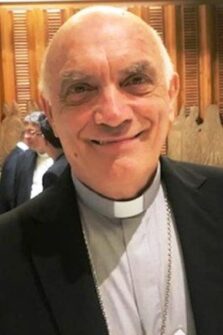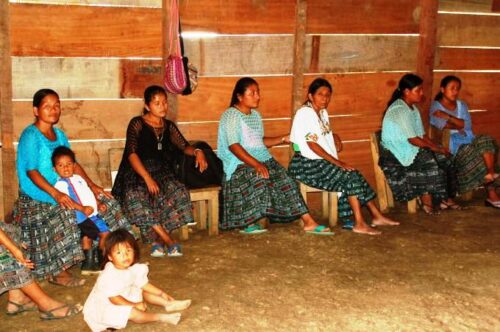Guatemala. A Failed State.
Drug trafficking, corruption, the danger of fraud in the next presidential elections. The Church’s commitment to defending the poor following the example of the martyrs of Quiché. We talk about it with Monsignor Rosolino Bianchetti Boffelli, Bishop of Quiché.
It was a day in August 1995. A farmer was working in his field. The hoe inadvertently moved a stone stuck in the dark earth. It was then that he noticed the strange object: a book closed in a plastic bag. With difficulty, on the thick black cover, the words ‘Holy Bible’ could still be read. The farmer took it, looked around and put it back in its place. He calmly placed the earth and stones on top. It was enough to have a bible at home to be tortured and killed.

Monsignor Rosolino Bianchetti Boffelli, bishop of the diocese of Quiché.
The violence of those bloody years did not extinguish faith. Books and sacred symbols were buried but they continued to be read and prayed with in secret. A missionary recounts: “The Christians buried the Bible. At night, the community gathered at that point to read some passages, thus resurrecting the Word”.That hidden bible symbolizes the historical memory of a civil war that bloodied Guatemala between 1960 and 1996. According to the Recuperación de la Memoria Histórica (REMHI) report, some 200,000 people were killed. More than a million people were forced to flee their homes and hundreds of villages were destroyed. The Commission for Historical Clarification attributed more than 93% of all documented human rights violations to the military government of Guatemala and estimated that Mayan Indians accounted for 83% of the victims. In 1999, the Commission concluded that the state’s actions amounted to genocide.
The martyrs of Quiché
In the highlands of Quiché, on the border with Mexico, tens of thousands were massacred, the vast majority were poor and indigenous people. With them priests, lay people, catechists, and operators were murdered for their commitment alongside the poor and oppressed.
Twenty-five years after the end of the conflict, the church wanted to recognize the sacrifice of many Christians who paid for their fidelity to the Gospel with their blood by beatifying on 23 April 2021, in the diocese of Quiché, three Spanish missionary priests of the Sacred Heart – José María Gran Cirera, Juan Alonso Fernández, and Faustino Villanueva – and seven lay people – Tomás Ramírez Caba, Rosalío Benito Ixchop, Reyes Us Hernández, Domingo Del Barrio Batz, Nicolás Castro, Miguel Tiu Imul, and Juan Barrera Méndez, just 12 years old. All murdered in ‘hatred of faith’ between 1980 and 1991.

Monsignor Rosolino Bianchetti Boffelli, of Italian origin, current bishop of the diocese of Quiché, explains the meaning of that beatification: “Our martyrs were men of great faith, of great trust in God, but at the same time, of great dedication so that there might be a change, a different Guatemala. They were courageous men who did not stop in the face of any kind of threat and ‘embraced their cross’. They were persecuted, tortured, and killed by those who saw the teachings of the gospel as ‘a danger’ to the interests of the powerful”.
The bishop of Quiché also underlines that the example of courage of these Christians is a source of inspiration for today’s communities in Guatemala, which must “face the threats of our time, such as poverty, lack of work, exploitation, and forced migration”.
Archbishop Bianchetti, looking at today’s Guatemala, is not afraid to denounce “the poor governance which has deteriorated more and more due to the oppressive and pervasive presence of organized crime,
linked to drug trafficking”.

Three missionary priests and seven lay people were beatified on 23 April 2021.
The bishop continues: “Drug trafficking has captured the state, at all levels. In the country, there has been an authoritarian involution and even the institutions that govern democracy (Constitutional Court, Supreme Court of Justice, Public Prosecutor, etc.) are increasingly controlled by the government, so much so that there is talk of possible fraud in the next presidential elections of June 2023. Furthermore, corruption is rampant, as happened during the pandemic, which has allowed the government to have a free hand with huge sums of money, leaving very few crumbs for the people”. The bishop insists on the Church’s commitment: “As the Catholic Church of Quiché, we have focused on the formation of leaders, starting from the concrete problems of the people: for example, the impact of large infrastructure projects, such as open pit mines or hydroelectric dams, that devastate the environment, take over natural resources, and harm local communities”.“Sometimes it is said that this is a people without hope; I would rather say that we are dealing with a people still marked by the bleeding scars of bestial violence and aware of the current
power of drug trafficking”.

During the civil war, more than 200,000 people were killed. Mayan Indians accounted for 83% of the victims.
The bishop insists: “We have an important network of Catholic broadcasters in the Quiché with a network of five diocesan radio stations that broadcast programs on social, cultural, religious issues, etc.; likewise in the nearby dioceses of Huehuetenango and Sololà. The plurality of these radios serves to enhance local cultural expressions, but they also have common programmes. On the occasion of the last political elections, the parishes promoted debates between the candidates who, however, do not respond to the requests of the people and disappear the day after the vote.”
” We are therefore increasingly convinced, as an Episcopal Conference, that it is necessary to establish a school for leaders, although this work, which is already partly present, is hindered by the need of young people, often the most prepared, to emigrate”.

Looking to the next Synod, Msgr. Bianchetti says: “I would like the role of the laity to be increasingly emphasized and recognized also at a juridical level. For this we also need a reform of canon law, which makes this role legal and not subject to a benign concession by the clergy. The laity could, not only in Guatemala, make a much greater contribution and this would make the Church more alive. Then there is the issue of married clergy, which Pope Francis left open after the Synod for the Amazon, probably to avoid divisions, but the possibility of ordaining married men as priests should be implemented. There are many leaders in the communities who would make excellent priests. I am very happy because this year I have already ordained four young priests, some of whom are indigenous Q’eqchi and Kaqchikel, an unprecedented number that brings the diocesan clergy to over forty units. When I arrived in the Quiché there were four of us! Paraphrasing Tertullian, I would say that ‘the blood of martyrs, of our martyrs, is the seed of new Christians, of new priests’. However, we need to think of a twofold type of priest, a celibate one, more missionary and itinerant, and a married one, residing in the communities. May the Holy Spirit enlighten us, so that we can also advance in this direction”.
Mauro Castagnaro and Pedro Santacruz



